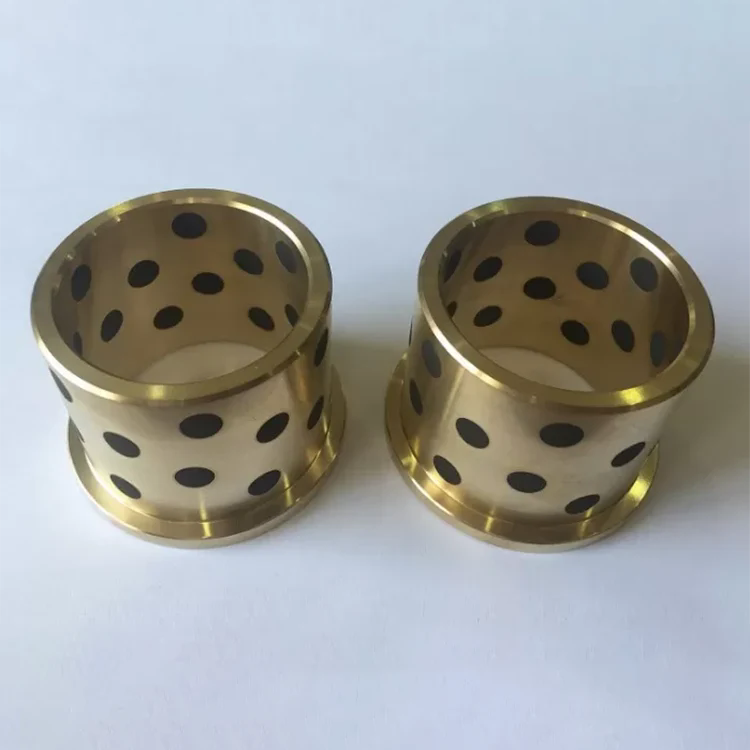Cast Bronze Bearings: Durability, Performance, and Applications
2025-05-12
In the world of mechanical components, bearings play an essential role in ensuring smooth and efficient movement within machines. Among the various types of bearings available, cast bronze bearings stand out for their exceptional durability, self-lubricating properties, and ability to withstand harsh conditions. These bearings have a long history of use across various industries and continue to be a top choice for many applications requiring robust and reliable performance.

What Are Cast Bronze Bearings?
Cast bronze bearings are bearings made from a specific type of bronze alloy, typically a mixture of copper and tin, with some variations incorporating other metals such as aluminum, zinc, or lead. The "cast" part of the term refers to the method of manufacturing these bearings, where molten bronze is poured into molds to create the desired shape and size.
Bronze, as a material, is known for its strength, resistance to wear, and ability to handle heavy loads, making it ideal for use in bearings. Unlike other materials such as steel or plastic, cast bronze bearings are particularly resistant to corrosion, especially in environments where exposure to moisture or chemicals is common.
Key Properties of Cast Bronze Bearings
1. High Durability
Cast bronze bearings are extremely durable due to the strength and toughness of the bronze material. This makes them ideal for high-load, high-pressure applications. The material's inherent strength allows these bearings to perform reliably in demanding environments, even under heavy stress.
2. Self-Lubricating Capabilities
One of the most significant advantages of cast bronze bearings is their ability to operate without the need for external lubrication. The bronze material itself has self-lubricating properties due to the inclusion of a small amount of lead or other materials within the alloy. This reduces friction and wear, making these bearings more efficient and long-lasting compared to other types of bearings that require continuous lubrication.
3. Corrosion Resistance
Bronze is highly resistant to corrosion, making cast bronze bearings suitable for use in damp or chemical-rich environments. Their resistance to rust and degradation ensures reliable performance in applications exposed to moisture, saltwater, and chemicals, which would typically wear out other materials such as steel or iron.
4. Heat Resistance
Cast bronze bearings have excellent thermal conductivity, allowing them to perform well under high-temperature conditions. Unlike some synthetic bearings, which can degrade under heat, bronze bearings retain their properties even when exposed to elevated temperatures. This makes them suitable for use in industrial applications that involve heat generation.
5. Low Friction
The natural properties of bronze, coupled with its self-lubricating capabilities, result in low friction between moving parts. This reduces wear and tear on both the bearings and the components they interact with, leading to longer-lasting machinery and reduced maintenance costs.
6. Shock Absorption
Cast bronze bearings are capable of absorbing vibrations and shocks, which helps protect other components from damage. This is particularly useful in applications where machinery or equipment is subjected to constant movement or impact.
Applications of Cast Bronze Bearings
Due to their versatility and durability, cast bronze bearings are used in a wide range of industries and applications. Some of the most common include:
1. Automotive Industry
Cast bronze bearings are commonly used in automotive components such as engine parts, steering systems, and suspension components. Their ability to withstand high loads and resist wear makes them an ideal choice for critical automotive applications where durability is paramount.
2. Industrial Machinery
In industrial machinery, cast bronze bearings are used in components like conveyor systems, pumps, and motors. The bearings' self-lubricating properties and resistance to high loads and temperatures ensure that industrial equipment operates smoothly and efficiently, even under demanding conditions.
3. Marine Applications
Given their resistance to corrosion and ability to perform in wet environments, cast bronze bearings are commonly used in marine applications, such as in boat engines, propellers, and other watercraft components. They provide reliable performance in saltwater environments, where other materials might quickly degrade.
4. Construction Equipment
In construction machinery, such as excavators, cranes, and bulldozers, cast bronze bearings are employed to reduce friction and wear in moving parts. These bearings ensure that construction equipment continues to operate smoothly, even in harsh conditions.
5. Heavy Equipment and Mining
Cast bronze bearings are also widely used in mining equipment and heavy machinery that require robust, wear-resistant components. They are found in applications such as crushers, excavators, and material handling equipment, where heavy loads and abrasive environments are common.
6. Agricultural Machinery
Agricultural machines, including tractors, harvesters, and irrigation systems, also benefit from the durability and corrosion resistance of cast bronze bearings. These bearings help to maintain the functionality and longevity of equipment that operates in tough, outdoor conditions.
Advantages of Cast Bronze Bearings
Cost-Effective
While cast bronze bearings may have a higher initial cost compared to some other materials, their durability and reduced maintenance requirements make them a cost-effective solution in the long run. Reduced downtime, fewer replacements, and lower maintenance costs all contribute to the overall savings.
Long Service Life
Due to their exceptional wear resistance and low friction, cast bronze bearings typically have a long service life. This reduces the frequency of replacement and repair, ensuring that machinery remains operational for extended periods without significant issues.
Minimal Maintenance
Cast bronze bearings, especially those with self-lubricating properties, require very little maintenance. This feature is particularly advantageous in industries where equipment uptime is crucial and any downtime for maintenance can result in costly delays.
Conclusion
Cast bronze bearings are a vital component in the operation of many types of machinery, providing unparalleled durability, corrosion resistance, and low friction. Their self-lubricating properties and ability to handle high loads make them an essential choice for a wide range of industries, from automotive to marine, industrial, and agricultural applications.
With their exceptional performance characteristics, cast bronze bearings continue to be a popular choice for engineers and manufacturers looking for reliable, long-lasting solutions. Whether you’re designing machinery that will face extreme conditions or seeking components for regular operations, cast bronze bearings provide the strength and resilience needed for efficient and cost-effective performance.


